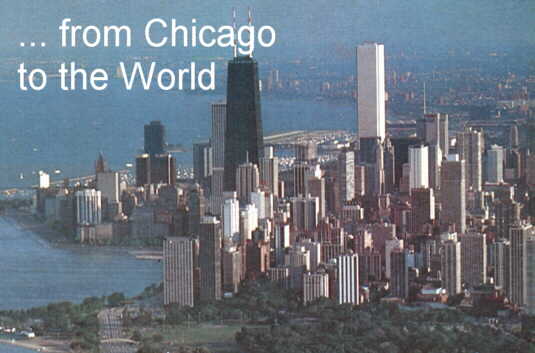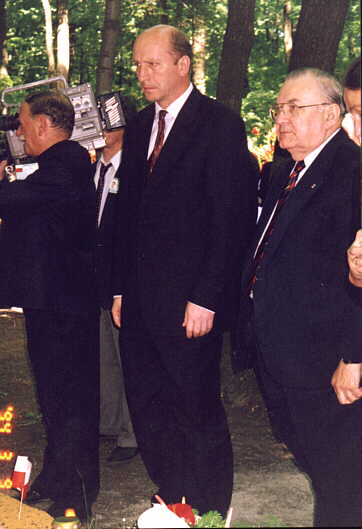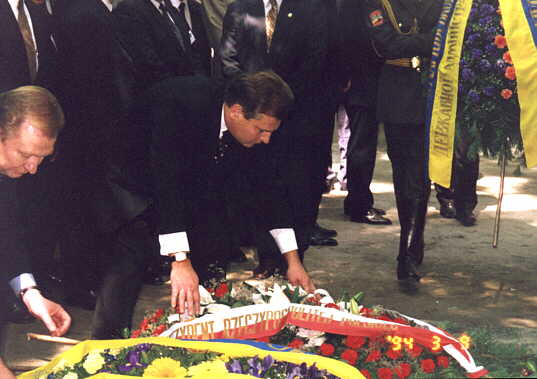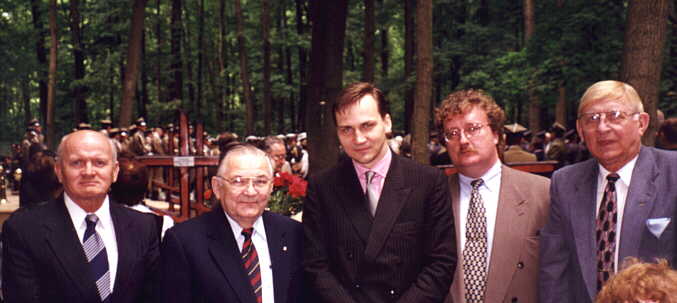 POLONIA
POLONIA POLONIA
POLONIAThe World's Most-Read Polish American Newsmagazine in the English Language
A Part of the Polonia Media Network®
 Kharkov,
Ukraine (PMN)--"It was very emotional ... the names of the
victims being read ... it made one feel sick," said Edward
J. Moskal, President of the Polish National Alliance (PNA) and
the Polish American Congress (PAC), describing the ceremony at
Kharkov, Ukraine, on June 27, 1998, establishing a cemetery for
those murdered by the communists. He quickly added, however,
"Something good will come out of this."
Kharkov,
Ukraine (PMN)--"It was very emotional ... the names of the
victims being read ... it made one feel sick," said Edward
J. Moskal, President of the Polish National Alliance (PNA) and
the Polish American Congress (PAC), describing the ceremony at
Kharkov, Ukraine, on June 27, 1998, establishing a cemetery for
those murdered by the communists. He quickly added, however,
"Something good will come out of this."
The emotion of which Moskal spoke was evoked in particular by the eyes of the surviving relatives of those whose remains were found at Kharkov. They obviously made a profound impact. So did the words of a still surviving NKVD guard, related by a woman at the scene, who complained that his job was so difficult "because they were bringing the prisoners in too fast."
The good that may result is the anticipated effect upon negotiations to restore a Polish cadet cemetery and a monument to U.S. airmen. Originally erected by the PNA in Lwow in 1925, the monument is now located within Ukrainian borders and surrounded by structures that mask it from the view of visitors.
 There are
approximately 7,500 graves at Kharkov. They include 4,300 graves
of Polish officers, brought from a camp at Starobielsk and
murdered in the Kharkov forest in 1940 by Soviet security forces.
It was part of the notorious murders known collectively as the
Katyn Massacre. Soldiers and civilians were shot in the back of
the head and thrown into pits located deep in the forest, far
from prying eyes.
There are
approximately 7,500 graves at Kharkov. They include 4,300 graves
of Polish officers, brought from a camp at Starobielsk and
murdered in the Kharkov forest in 1940 by Soviet security forces.
It was part of the notorious murders known collectively as the
Katyn Massacre. Soldiers and civilians were shot in the back of
the head and thrown into pits located deep in the forest, far
from prying eyes.
Moskal led an official delegation invited by the Polish President and was taken to the cemetery site by air. He was accompanied by PNA Treasurer Kazimierz Musielak, "Dziennik Zwiazkowy" editor Wojciech Bialasiewicz and Jozef Bulat, the PNA's legal advisor for Polish Affairs. Also present were other Polish officials, including the Speaker of the Sejm [Parliament]. About 200 Polish citizens, primarily family members of Katyn victims, arrived by train to participate in the ceremonies.
Polish President Aleksander Kwasniewski and Ukrainian President Leonid Kuchma laid a cornerstone to mark the planned cemetery. Catholic and Orthodox services commemorated the dead, attended as well by Protestant ministers. Among the 2,500 civilians buried at the site are Poles, Ukrainians, Russians and Jews. A band and honor guard from the Polish Army paid homage to the victims.
 Signing a document
recognizing the graves as a memorial to Stalinist repression,
Presidents Kwasniewski and Kuchma wrote "Let this cemetery
be a warning to future generations, so that the nightmare of
totalitarianism can never return to this land."
Signing a document
recognizing the graves as a memorial to Stalinist repression,
Presidents Kwasniewski and Kuchma wrote "Let this cemetery
be a warning to future generations, so that the nightmare of
totalitarianism can never return to this land."
Moskal was hopeful that improved Polish-Ukrainian relations, demonstrated by the ceremony at Kharkov, would result in action to restore the gravesites of Polish cadets in Lwow. Their graves have been closed to the public, being an unpleasant reminder to Ukrainians that a small group of youthful Poles had once withstood an attack by larger Ukrainian forces in 1918. The new situation may help change Ukrainian attitudes.
The PNA had erected a monument in Lwow to U.S. airman in gratitude for their efforts on behalf of Polish freedom after World War I, during the Polish-Soviet conflict. After World War II, when borders changed and Lwow became a part of Ukraine, the monument was covered and totally neglected. Moskal was confident that Ukrainian officials, in the aftermath of the joint project at Kharkov, might now permit the PNA to restore the historic monument.
Captions:
[Top Right] Edward J. Moskal (right), PNA and PAC President, and Radek Sikorski, deputy Minister of Foreign Affairs, at the Kharkov cemetery dedication ceremony.
[Middle Left] Polish President Aleksander Kwasniewski (center) and Ukrainian President Leonid Kuchma lay wreaths at the burial place of Polish and Ukrainian victims of Stalinism during WWII.
[Bottom Right] Maciej Plaszynski (Center), Speaker of the Polish Parliament [Sejm], at the Kharkov cemetery with (l. to r.) PNA legal Advisor for Polish Affairs, PNA and PAC President Edward J. Moskal, Illinois Office in Poland Director Maciej Cybulski and PNA Treasurer Kazimierz Musielak.
Copyright© 1998 - The AngloPol Corporation. Reproduced Here by Permission.
visit us at http://www.poloniatoday.com
Polonia Today and Polonia Media Network are registered in the U.S. Patent and Trademark Office. Both are registered trademarks of the AngloPol Corporation and their use without written permission is strictly prohibited by law.